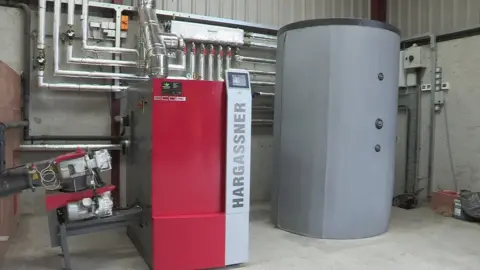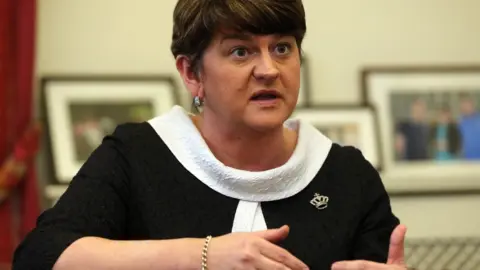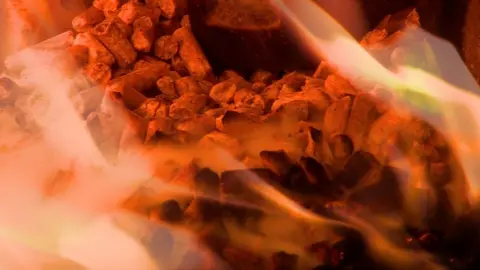Renewable Heat Incentive scheme: Timeline of events
 BBC
BBCThe Renewable Heat Incentive scheme was first mooted in 2008, offering financial incentives for businesses to start using renewable fuels to generate heat.
We look at the timeline of events which led to the biggest political crisis in Northern Ireland for more than a decade.

- 2008 - Path to RHI begins. Britain starts to plan its scheme and the idea is floated in Northern Ireland.
- 2011 - Detailed work gets under way for an NI scheme, but consultants miss the "cash-for-ash" flaw at its heart - the subsidy is set higher than the fuel cost.
- 2012 - The then DUP Enterprise minister, Arlene Foster, launches RHI for businesses in Northern Ireland. It has no cost controls. Uptake is slow.
- 2013 - A chance to put in cost controls is lost. The Department for Enterprise, Trade and Investment ( Deti) wants to extend the scheme to domestic homes and prioritises that instead. A whistleblower's concerns on scheme abuse are ignored by officials.
 Niall Carson/PA Wire
Niall Carson/PA Wire- 2015 - In March, the growing number of applicants puts a lot of pressure on the budget. In May, as Arlene Foster leaves the department, civil servants begin pushing for cost controls, but report resistance from DUP advisers.
- In late August, controls are agreed by Arlene Foster's successor, the then DUP enterprise minister, Jonathan Bell.
- Subsidy cuts are announced in September but won't apply until mid-November because of a legislative delay. The delay, and the briefing of industry by officials, leads to a massive spike in boiler applications; 900 flood in, doubling numbers on the most lucrative rates and compounding what is already a financial crisis.
- In December, the Department of Enterprise, Trade and Investment realises that the Treasury won't be writing a cheque to cover RHI and the huge projected overspend will have to come out of the Stormont block grant. It is later estimated at £500-700m over 20 years, though later subsidy cuts eliminate that risk.
- 2016 - The scale of the financial hole forces the executive to rush through the closure of RHI to new applicants.
- In July, the Northern Ireland Audit Office lays bare the scale of the projected over-spend. It airs claims of a farmer earning £1m over 20 years for heating an empty shed - something that was never proven.
- The assembly's Public Accounts Committee digs into the scandal. Its work forms the basis of a BBC Spotlight investigation in December which also highlights the existence of the 2013 whistleblower.
- The media focuses intently on the scandal. The whistleblower gives an interview to the BBC's Stephen Nolan show. Next, former enterprise minister Jonathan Bell tells the show that DUP advisers tried to keep the lucrative scheme open as cash haemorrhaged.

- 2017 - Arlene Foster, by now first minister, comes under huge pressure over her role in RHI, but refuses to stand down. Then deputy first minister Martin McGuinness resigns in January, effectively collapsing Stormont. The RHI Inquiry is established and an election is called but Stormont does not return for three years.
- RHI subsidy rates are cut, the first of several big reductions applied, effectively eliminating any overspend.
- In November, the RHI Inquiry has its first public hearing. It runs until December 2018.
